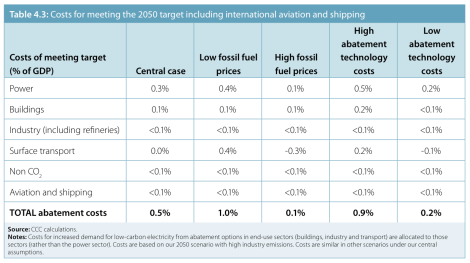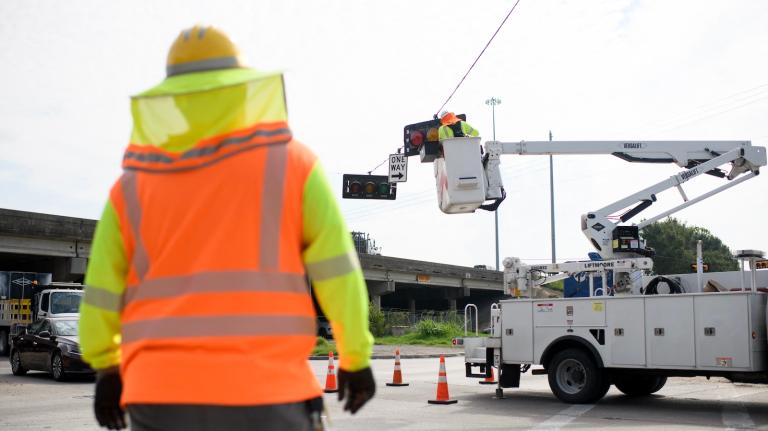You’ve heard it before: Politicians say they’d love to take action against climate change, but they’re reeling from sticker shock. Today, a new report from the U.K.’s leading climate change watchdog refutes this oft-cited argument that climate action will herald economic Armageddon.
The Committee on Climate Change (CCC) report, with the hairy-sounding title “Statutory Advice on Inclusion of International Aviation and Shipping,” says that in 2050, the U.K.’s emissions reductions across the whole economy will cost 1 to 2 percent of the total GDP. This updates, in greater detail, the range predicted half a decade ago by the watershed Stern Review.
Just how much is that? For a rough comparison, one percent of the U.K.’s 2011 GDP is a little more than what the country currently spends on public housing and community amenities, and is nowhere near the big-ticket public spending items like healthcare.
The U.K. has enshrined in law an emissions reduction of 80 percent on 1990 levels by 2050.
“It’s a very compelling economic case to act,” says David Kennedy, CEO of the CCC, an independent statutory body charged with advising parliament on all things climate. “You don’t need radical behavior and lifestyle change to achieve our climate objectives. It’s a very, very small impact on growth. And what you get for that is a whole range of economic benefits.”
This table from the report details the cost in 2050 of meeting emissions reductions in a few different scenarios, including if fuel prices are high or low:
The report says that cost is not an impediment, even when factoring into the mix international aviation and shipping, two sectors that have previously been left out of the U.K. government’s carbon budgets.
Cost is a familiar argument against climate action for U.S. readers. As president, George W. Bush refused to ratify the Kyoto Protocol, calling it a job killer that placed unfair economic burdens on the U.S. while letting poorer countries off the hook. And in Congress, the ill-fated cap-and-trade bill of 2009 fell victim, in part, to arguments that consumers would foot the bill by paying more for electricity. The Heritage Foundation said cap-and-trade could raise the average family’s annual energy bill by $1,241. House Republicans called it “a light switch tax that would cost every American household $3,128 a year,” a statement that has been widely disputed.
But Kennedy says talk of economic meltdown is wrong. “They talk about the economy being closed down, about an ‘end to growth.’ Well, that is frankly nonsense, and the debate should be around the correct number.”
The cost in GDP terms in the U.K. report accords with U.S. studies. The Congressional Budget Office reported similar reductions would reduce the GDP here by 1 to 3.5 percent in 2050. One of the co-sponsors of the 2009 cap-and-trade bill, Rep. Edward Markey (D-Mass.), said the scheme would cost the average family the equivalent of “about a postage stamp a day,” far less than critics claimed.
John Reilly, co-director of an MIT research group studying climate economics, says the U.K. predictions are in the “sensible range” for the U.K., but a little rosy when applied around the world. “It may be a bit optimistic on the low end because we’ve not seen a lot of evidence that countries have been able to adopt clean, broad cap-and-trade-incentives without gunking them up with policies that add to the cost.”
What complicates things further is that the cost of not acting is “hugely difficult to estimate and quite controversial,” he says. It’s hard to get a handle on how, and when, costs from severe weather or ecological loss will mount. “We’re seeing things we never even thought of 20 years ago. So we continue to be surprised. And those surprises aren’t good.”
Put another way: “We’ve jumped off the cliff, but we haven’t landed yet. And it’s hard to stop ourselves in midair.”
Regardless of the complexity of working out the costs of inaction, the vast majority of economists agree that the environmental effects of greenhouse gas emissions create significant risks to the U.S. economy. A 2009 survey of 289 of the world’s top economists with expertise on climate change found broad consensus that the benefits of action outweighed the cost.
David Kennedy says his estimates give people a solid idea to hold on to: “Unless people have a tangible sense of what it is we can do, they will feel helpless. There isn’t any need to be helpless. There is a set of things we can do, and we should get on and do them.”
Kennedy warns that the U.S. is lagging behind and risks “storing up costs” for the future. “There is action in various states of the U.S. But at the national level, clearly the U.S. has not got anything like the ambition we have, and I think in the long term that will be to the economic detriment of the U.S.”
Listen to part of James West’s interview with David Kennedy:
 This story was produced as part of the Climate Desk collaboration.
This story was produced as part of the Climate Desk collaboration.






